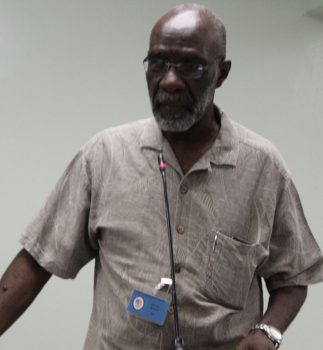Chairman of the Forbes Burnham Foundation, Vincent Alexander, yesterday petitioned for the return of ancestral lands that were “unjustly” transferred from their rightful owners and for the administrative authority of local villages to once again be vested in the village councils.
Alexander appeared before the commission of inquiry (CoI) investigating African ancestral lands and other land matters, yesterday, when he lobbied for the return of communal lands to the descendants of enslaved Africans who had purchased them. Those lands were once plantations and, once bought, were converted into villages.
“I am hoping that the commission comes to terms with the fact that these lands were unjustly transferred and that they seek to ensure that justice is meted out to those villagers who have suffered as a consequence of the unjust transfer of the lands,” the Chairman told the tribunal.

“I’m hoping that in recognition of this fact and the possibility that with the present regime there may be furtherance of this act… that a recommendation is made for such lands if they have not yet been transferred, to become the sole custody of the villagers so that the villagers who are in fact the inheritors of what the ancestors bought can retake control of lands which rightly belong to them,” Alexander said.
He noted that while his presentation focused mainly on the return of communal lands, that there is the need for an audit of all ancestral lands to determine how the properties changed hands and under what conditions, and if wrong was done in the process so there can be redress.
The redress he recommended was either through compensation or return of the properties to the villagers.
Asked what steps can be taken to aid in such redress, the Chairman suggested that legislative mechanisms can be employed.
In his argument for the return of administrative power to the village councils, Alexander shared the view that it was the removal of power from these groups that ultimately resulted in the loss of property.
He opined that it is only with the reinstitution of this power that the lands can be used to the benefit of the villagers.
Relating that the land administration was first managed by the management committees of respective villages, then the local authorities, which were made up of villagers, he noted that over time the composition of these councils changed.
“…But over time, the local government system changed and those villages became engulfed in larger local government entities, the councils of which were no longer representative of those people, and involved persons physically outside of the villages. It involved councils comprising members who were not from the village and in some instances, not only were they not from the village, but they were not from the ethnic group that had acquired those ancestral lands,” Alexander explained.
Alexander asserted that it is “unfair” and “unjust” for lands acquired by purchase to have authorities of “alien” nature be given responsibility for the lands, inclusive of which is the right to dispose of it.
On the use of land, he said empowerment would be vested in the village council, which would consult with villagers in the decision making process. In doing so, they would take into account the original intended use of the land, which he noted were for communal purposes.
“As you know, it’s a difficult issue, having time gone by, and things have changed. Now you have things like cohesion and all these things. How can we blend it then?” the CoI’s Chairman, Reverend George Chuck-A-Sang, asked Alexander.
“There is tremendous potential for cohesion if there is recognition in diversity. If we recognise each other’s being, that is the foundation for cohesion. That recognition allows them to work collectively because you have a single perspective, though you may have different interests,” Alexander stated.
The commission’s mandate is to examine and make recommendations to resolve all the issues and uncertainties surrounding the individual joint or communal ownership of land acquired by freed African; claims of Amerindian land titling and other matters relative to land titling.
The Commission is being chaired by Reverend George Chuck-a-Sang, with David James, Professor Rudolph James, Lennox Caleb, Berlinda Persaud, Carol Khan-James and Paulette Henry.





